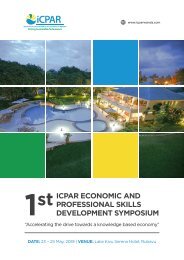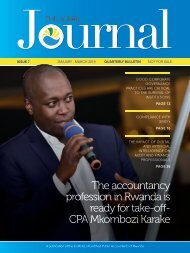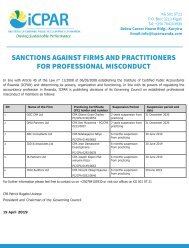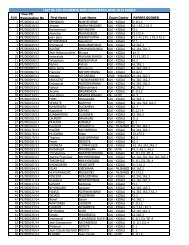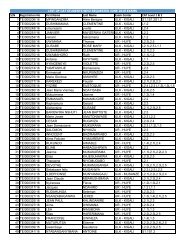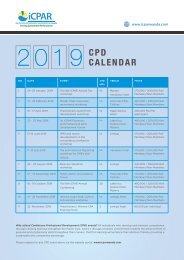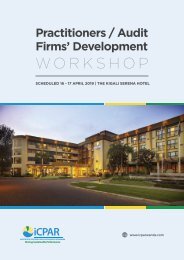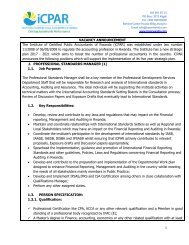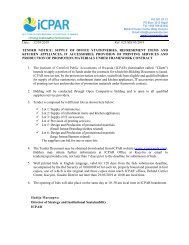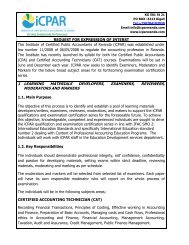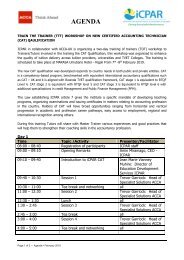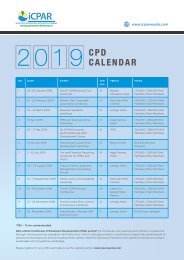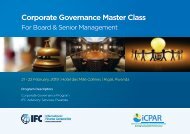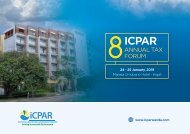iCPARQuarterlyBulletin-December2017.pdf
Create successful ePaper yourself
Turn your PDF publications into a flip-book with our unique Google optimized e-Paper software.
Journal<br />
THE iCPAR<br />
ISSUE 2<br />
OCTOBER - DECEMBER 2017<br />
iCPAR QUARTERLY BULLETIN<br />
NOT FOR SALE<br />
iCPAR<br />
PARTNERS WITH GOVERNMENT<br />
to increase accountancy professionals<br />
A publication of the Institute of Certified Public Accountants of Rwanda
ABOUT US<br />
The Institute is the sole professional accountancy<br />
organization established by law 11/2008 of 6 th May<br />
2008 with a broad mandate to grow and regulate the<br />
accountancy profession<br />
WHAT WE DO<br />
We regulate the accountancy profession; We preserve<br />
the integrity of the accounting profession; We promote<br />
the competence and the capacities of own members.<br />
We deliver accounting qualifications, programs<br />
and examinations.We promote compliance with<br />
professional standards<br />
VISION<br />
A strong, relevant and sustainable profession<br />
MISSION<br />
To build a strong and engaged professional<br />
accountancy organization that anticipates stakeholder<br />
expectations and acts in the public interest<br />
OUR OFFICE<br />
KG 501 St 21, behind Career Center Building<br />
P.o.Box: 3213 Kigali Rwanda<br />
T: +250 784103930<br />
F: +250 280103930<br />
E: info@icparwanda.com
THE iCPAR JOURNAL<br />
3<br />
Inside this Issue<br />
12<br />
20 24<br />
4. Foreword<br />
5. Curriculum,<br />
Professional Education<br />
& Examinations<br />
Commission<br />
6. iCPAR partners with<br />
Government to<br />
increase accountancy<br />
professionals<br />
8. Guest of Honor’s Speech<br />
at the iCPAR Annual<br />
Seminar<br />
10. The 6th iCPAR Annual<br />
Seminar in pictures<br />
DISCLAIMER<br />
12. How best can you<br />
prepare for exams?<br />
13. At the 6th ICPAR Annual<br />
Seminar, work met CSR<br />
and play<br />
15. iCPAR and IFC partner to<br />
promote good corporate<br />
governance practices<br />
16. The future of<br />
accountancy profession<br />
is bright- Accountant<br />
General<br />
PUBLISHER<br />
19. How iCPAR is preparing<br />
for the challenges facing<br />
the finance profession<br />
& the next generation of<br />
professionals<br />
22. The 3 critical roles of<br />
professional accountants<br />
to sustainable economic<br />
growth and development<br />
24. Deferred taxation<br />
demystified<br />
26. What do you want to be<br />
when you grow up?<br />
28. Humour, Crossword<br />
Reproduction of any article in this journal<br />
without permission is prohibited. The editor<br />
reserves the right to use, edit or shorten<br />
articles for accuracy, space and relevance<br />
Copyright © iCPAR 2017. All rights reserved.<br />
Copyrights and all / or other intelectual property rights on<br />
all designs, graphics, logos, images, phots, texts, trade<br />
names, trademarks, etc in this publication are reserved.<br />
The reproduction, transmission or modification of any part<br />
of the contents of this publication is strictly prohibited.<br />
OUR OFFICE<br />
KG 501 St 21, behind Career Center Building<br />
P.o.Box: 3213 Kigali Rwanda<br />
T: +250 784103930<br />
F: +250 280103930<br />
E: info@icparwanda.com<br />
DISCLAIMER<br />
Views expressed in the journal are not necessarily those of the institute, management<br />
and employees.<br />
A PUBLICATION OF THE INSTITUTE OF CERTIFIED PUBLIC ACCOUNTANTS OF RWANDA<br />
OCTOBER - DECEMBER 2017
4 Journal<br />
THE iCPAR<br />
Foreword<br />
Dear ICPAR Member,<br />
In the first issue of the ICPAR journal, we<br />
made a commitment to regularly be in<br />
touch with our members and stakeholders<br />
as a way of deepening our relationship<br />
and we intend to keep that promise.<br />
Firstly I would like to convey my sincere<br />
gratitude to all our members, stakeholders<br />
and well-wishers for the successful 6th<br />
ICPAR Annual Seminar held in Rubavu<br />
district from 4th to 6th October, 2017.<br />
It is with no doubt that the conference<br />
wouldn’t have been a success without<br />
your contributions and interventions in<br />
various ways. With your continued support,<br />
we promise to make the 2018 annual<br />
seminar even better.<br />
As we are coming towards the end of the<br />
year, I would like to remind our members<br />
and stakeholders to renew their membership<br />
and practicing licenses. It is important<br />
that our members begin to plan accordingly<br />
so that we commence 2018 with<br />
every membership and practicing license<br />
renewed. We would also like to call upon<br />
our members to file the continuing professional<br />
development returns as per membership<br />
obligations.<br />
I would like to remind our members<br />
and stakeholders to renew their<br />
membership and practicing licenses.<br />
It is important that our members<br />
begin to plan accordingly so that<br />
we commence 2018 with every<br />
membership and practicing license<br />
renewed.<br />
We would like to urge students who will<br />
be sitting for the CPA and CAT examination<br />
this December to prepare well for<br />
exams and take this opportunity to wish<br />
them success.<br />
Lastly, on behalf of the entire ICPAR secretariat<br />
and on my own behalf I would like<br />
to wish everyone happy holidays.<br />
AMIN MIRAMAGO<br />
Chief Executive Officer | Secretary General<br />
AMIN MIRAMAGO<br />
iCPAR CEO | SG<br />
iCPAR QUATERLY BULLETIN<br />
OCTOBER - DECEMBER 2017
GET TO KNOW<br />
YOUR COMMISSIONS<br />
THE iCPAR JOURNAL<br />
5<br />
Curriculum, Professional<br />
Education & Examinations<br />
Commission<br />
The Curriculum, Professional Education<br />
and Examinations Commission<br />
is one of the technical<br />
commissions under the Institute of Certified<br />
Public Accountants of Rwanda<br />
responsible for executing professional<br />
qualifications operations at the local<br />
and international level.<br />
Article 49 of the Law Nº 11/2008 of<br />
06/05/2008 establishing the Institute of<br />
Certified Public Accountants of Rwanda<br />
establishes professional accountants<br />
curriculum, professional education<br />
and examinations commission and ap-<br />
CPA Norbert Kagoro<br />
CHAIRPERSON<br />
CPA Lindsay Hodgson<br />
MEMBER<br />
CPA Emmanuel Tchoukou<br />
MEMBER<br />
pointment modalities of its members.<br />
FUNCTIONS:<br />
Main functions of the education commission<br />
include:<br />
• To determine a draft syllabus for the<br />
award of a professional qualification<br />
in accountancy which shall be approved<br />
by the Governing Council of<br />
the Institute;<br />
• To organize, supervise and mark the<br />
examinations for those who have<br />
pursued professional courses;<br />
• To monitor the training of courses<br />
leading to professional qualifications<br />
in accounting<br />
• To determine the fees payable by<br />
examination candidates approved<br />
by the Governing Council of the Institute;<br />
• To set up examination rules, their<br />
enforcement and to recommend<br />
punishment for persons in contravention<br />
;<br />
• To suggest the form of professional<br />
qualifications in accountancy this<br />
shall be approved by the Governing<br />
Prof. Rama B. Rao<br />
MEMBER<br />
Council of the Institute;<br />
Mr. Vincent Nkuranga<br />
MEMBER<br />
• To promote the recognition of those<br />
professional qualifications in Rwanda<br />
and internationally;<br />
• To perform any other activity that<br />
may be conducive to the fulfillment<br />
of its functions. In the Fulfillment of<br />
its responsibilities, the Commission<br />
may seek technical advice from experts.<br />
The Curriculum, Professional Education<br />
and Examinations Commission is<br />
composed of 8 individuals.<br />
• Three members are appointed by the<br />
general assembly,<br />
• one person appointed by the Minister<br />
of Finance to represent general<br />
interest of private sector in the<br />
Ms. Rose Mukantabana<br />
MEMBER<br />
accountancy profession who shall<br />
possess at least a university degree<br />
in accountancy;<br />
• One person nominated by a consortium<br />
of recognized universities and<br />
colleges offering courses leading to<br />
qualifications in accountancy, who<br />
shall have a teaching experience of<br />
at least three (3) years as a lecturer in<br />
accountancy;<br />
• Ex-officio members include: The Director<br />
of Rwanda National Examinations<br />
Council for Primary and Secondary<br />
Education;<br />
• The Director of National Curriculum<br />
Development;<br />
• The Executive Secretary of the National<br />
Council of Higher Education<br />
A PUBLICATION OF THE INSTITUTE OF CERTIFIED PUBLIC ACCOUNTANTS OF RWANDA<br />
OCTOBER - DECEMBER 2017
6 Journal<br />
THE iCPAR<br />
iCPAR partners with<br />
Government to increase<br />
accountancy professionals<br />
The institute of Certified Public<br />
Accountants of Rwanda<br />
(iCPAR) in October convened<br />
the 6 th Annual Seminar in<br />
Rubavu district themed professional<br />
Accountancy in the modern<br />
age”. The three day meet aimed at<br />
tackling challenges affecting the<br />
accountancy profession.<br />
One of the issues that stood out<br />
was the acute shortage of certified<br />
accountants in Rwanda and<br />
how the gap can be bridged. There<br />
was a general consensus that the<br />
shortage of qualified accountants<br />
continues to curtail the ability of<br />
accountancy professional to deliver<br />
beyond basics and contribute<br />
meaningfully to Rwanda’s development.<br />
“It is an open secret that Rwanda<br />
suffers from severe shortage in<br />
terms of number and quality of<br />
certified accountants. This is clearly<br />
visible in our statistics where the<br />
number of certified accountants is<br />
at a mere 0.22 for every 1000 residents<br />
of this great country,” Richard<br />
Tusabe, the Commissioner General<br />
of Rwanda Revenue Authority and<br />
chief guest at the annual seminar<br />
said.<br />
According to statistics, by December<br />
2016, Rwandans with professional<br />
qualification recognized by<br />
IFAC were 297 of which only 20%<br />
Participants at the opening of the 6th ICPAR Annual Seminar in Rubavu<br />
work in the public sector.<br />
“Yes, the numbers are still low<br />
especially in the public sector.<br />
However through the qualification<br />
framework at iCPAR, we hope to<br />
have more of our accountants attain<br />
professional qualifications,”<br />
Marcel Mukeshimana, Accountant<br />
General said.<br />
To beef up the numbers, Government<br />
is currently sponsoring 1, 130<br />
staff who are currently undertaking<br />
professional courses. Furthermore,<br />
government has taken on<br />
strategic actions to ensure critical<br />
mass of professional accountants<br />
is attained. This include supporting<br />
ongoing initiatives at higher<br />
institutions of learning which consists<br />
of blending the bachelor’s degree<br />
with professional accounting<br />
courses such that by the time the<br />
students completes a bachelor’s<br />
degree he also qualifies as a CPA.<br />
“This approach has been helpful<br />
in that out of the 297 qualified<br />
accountants 160 graduated<br />
iCPAR QUATERLY BULLETIN<br />
OCTOBER - DECEMBER 2017
THE iCPAR JOURNAL<br />
7<br />
through the twining initiative,” AG<br />
Mukeshimana said.<br />
Another critical issue faced by the<br />
accountancy profession in Rwanda<br />
that equally needs concerted effort<br />
is the lack of enough certified accounting<br />
technicians. Currently<br />
certified public accountants outnumber<br />
Certified Accounting Technicians<br />
(CAT) by 10 to 1. Out of all<br />
the chartered accountants in the<br />
country, 98% are CPAs while the<br />
remaining are CATs yet standards<br />
dictate that every CPA should be<br />
supported by 7 CATs.<br />
“Such as situation cannot be sustainable,”<br />
CPA Bosco Mkombozi<br />
Karake, the president of iCPAR<br />
governing council noted. He added<br />
that the lack of certified accounting<br />
technicians affects the<br />
quality of accounting as indicated<br />
by the auditor general reports”.<br />
“If you analyze the auditor general’s<br />
report you realize that most<br />
of the issues highlighted are errors<br />
and omissions. These can be avoided<br />
once we reach a critical mass of<br />
certified accounting technicians,”<br />
Mkombozi said.<br />
iCPAR has partnered with government<br />
through Workforce Development<br />
Agency to ensure CAT curriculum<br />
is aligned to that one of TVET.<br />
“Through partnerships with various<br />
government agencies, we are a trying<br />
to align our strength where it<br />
is most needed by focusing on the<br />
base rather than the apex,” Mkombozi<br />
said.<br />
To complement efforts, the institute<br />
is promoting professional accounting<br />
in secondary schools and<br />
universities inspiring students to<br />
consider careers in accounting and<br />
finance.<br />
CPA Sunday Kalisa, the director for<br />
professional standards and services<br />
at iCPAR, underscored that part of<br />
the institute’s broader mandate<br />
was to promote the professional<br />
accounting as a yard stick for<br />
prudent financial management.<br />
“It’s our major responsibility to<br />
promote professional accounting<br />
courses, offer required skills to<br />
allow students to learn accounting<br />
best practices in line with<br />
applicable standards” CPA Kalisa<br />
said.<br />
CPA Sunday Kalisa talks to students about the accountancy profession<br />
In line with the institute’s five year<br />
strategy (2016-2021) ICPAR intends<br />
to produce at least 2000 CAT<br />
by the end of the strategy period.<br />
A PUBLICATION OF THE INSTITUTE OF CERTIFIED PUBLIC ACCOUNTANTS OF RWANDA<br />
OCTOBER - DECEMBER 2017
8 Journal<br />
THE iCPAR<br />
Commissioner General of RRA Richard Tusabe addresses the 6th ICPAR Annual Seminar<br />
Guest of Honor’s Speech at<br />
the iCPAR Annual Seminar<br />
ICPAR President,<br />
ICPAR Governing Council Members,<br />
ICPAR Commissioners,<br />
Distinguished members and delegates<br />
Ladies and Gentlemen,<br />
It is an honor to be here with you<br />
today on this 6 th Annual ICPAR<br />
Annual Seminar. I must admit that<br />
this is my first one and I can see I<br />
missed quite a lot. This is demonstration<br />
that the institute has come<br />
from far. One cannot imagine that<br />
it was only yesterday that the 98 of<br />
us founded this great institute. It<br />
was a very painful process just like<br />
any other beginning. We have had<br />
our fair share of ups and downs but<br />
these have only served to strengthen<br />
our resolve.<br />
I’m glad to hear that the membership<br />
has grown from a paltry 98<br />
to 443 and over 1771 students<br />
from an initial 165. This can be increased<br />
further. I have been made<br />
to understand that audit firms<br />
particularly the large ones have a<br />
large number of staff that are not<br />
registered with the institute. Guys<br />
please do register your staff as we<br />
are counting on you as our big<br />
firms to really be at the forefront of<br />
supporting the profession and the<br />
institute in particular.<br />
I’m also glad that an AQA was<br />
completed in 2016 and that the<br />
member firms are being encouraged<br />
to implement the recom-<br />
iCPAR QUATERLY BULLETIN<br />
OCTOBER - DECEMBER 2017
THE iCPAR JOURNAL<br />
9<br />
mendations. I urge the Inspection,<br />
disciplinary commissions and the<br />
Governing Council not to negotiate<br />
with quality. As you may all be<br />
aware the profession is on a trial<br />
globally due to widespread scandals<br />
that have also engulfed the<br />
big fours. Let’s work to prove that<br />
self-regulation can work otherwise<br />
we are going to ruin the reputation<br />
of the profession.<br />
I’m told this conference has over<br />
180 delegates which is a record<br />
attendance compared to other previous<br />
events for the institute with<br />
a well-chosen theme “Professional<br />
Accountancy in the modern age”.<br />
Besides complying with CPD requirements<br />
for maintaining membership,<br />
a lot of changes are taking<br />
place globally and it is imperative<br />
that we as certified accountants<br />
are abreast with these changes. As<br />
Prof. John Mbithi once said, if you<br />
don’t change, change will change<br />
you. Let’s not wait for change to<br />
change us otherwise we won’t like<br />
it.<br />
I’m here to bring a clear message<br />
from the regulators that we are<br />
glad the institute has finally known<br />
it’s rightful place and we want to<br />
say in a clear, big and loud voice<br />
that we are ready for business particularly<br />
in this second phase of<br />
ICPAR’s development where accountancy<br />
is seeking to be become<br />
a strong, relevant and sustainable<br />
profession.<br />
This is also demonstrated by the<br />
number of institutions here ready<br />
to sign MoUs with the institute.<br />
This is a clear sign that we appreciate<br />
the role the institute can play in<br />
a nation’s development. So please<br />
my dear accountants don’t feel shy,<br />
you have a huge responsibility to<br />
lift this country to great heights.<br />
The vision 2050 rests on our ability<br />
to deliver beyond the basics.<br />
It’s an open secret that as a country<br />
we suffer from a severe shortage<br />
in terms of number and quality of<br />
certified accountants. This is clearly<br />
visible in our statistics where the<br />
number of certified accountants<br />
are at a mere 0.22 for every 1000<br />
residents of this great country. Out<br />
of all the chartered accountants in<br />
the country, 98% are CPAs while<br />
the remaining are CATs yet standards<br />
dictate that every CPA should<br />
be supported by 7 CATs. To put it in<br />
clearly we are in a situation where<br />
the few doctors that are available<br />
are more than nurses. It’s not sustainable.<br />
So how are we going to<br />
survive as a nation?<br />
It’s a question that we have been<br />
asking ourselves for quite a long<br />
time at RRA and I know even a<br />
number of other institutions have<br />
been asking themselves this question<br />
as well. I’m happy to announce<br />
to you that at RRA we have<br />
decided to be among the front<br />
runners. We are going to aligning<br />
our job grades to the ICPAR Qualifications<br />
and require both our staff<br />
and tax advisors to have the requisite<br />
qualification within a specified<br />
timeline so that we create that cut<br />
off. From that point those people<br />
those that won’t have qualified<br />
then they we will not be part of us<br />
and those that will have qualified<br />
will be brought under the institute.<br />
We wish to inform you that it has<br />
never been our intention to regulate<br />
the tax practitioners, these fall<br />
within the broad remit of the institute<br />
but we were merely trying to<br />
mitigate a risk which the institute<br />
was not handling at the time. With<br />
that cut off period then, all practitioners<br />
will be regulated by the<br />
institute and we will only focus on<br />
our core mandate well knowing<br />
that someone capable is handling<br />
this mandate. We encourage you<br />
to handle that mandate with due<br />
care as it is the bed rock for everything<br />
that we do as an organization<br />
and a country.<br />
We will support our staff and the<br />
tax advisors to undergo the CAT<br />
and CPA qualifications while at the<br />
same time continuing to give them<br />
the necessary continuous professional<br />
development as learning is<br />
a continuous process which only<br />
stops at death.<br />
Without much ado, distinguished<br />
participants allow me to end my<br />
remarks by wish you all fruitful deliberations<br />
during the next 3 days.<br />
A PUBLICATION OF THE INSTITUTE OF CERTIFIED PUBLIC ACCOUNTANTS OF RWANDA<br />
OCTOBER - DECEMBER 2017
10 Journal<br />
THE iCPAR<br />
The 6 th iCPAR Annual<br />
Seminar in pictures<br />
The Institute of Certified Public accountants of<br />
Rwanda concluded a successful three-day seminar<br />
in Rubavu District. The event ran from October<br />
4-6, 2017.<br />
Aside from deliberating current trends and issues of the<br />
profession, delegates at the ICPAR Annual Seminar participated<br />
in Corporate Social Responsibility activities.<br />
They visited Nyundo School of Arts and Music where<br />
they were entertained by aspiring artists. The ICPAR<br />
fraternity donated Frw 4 million to the artistry cause.<br />
It was not all work without play as delegates got involved<br />
in various sporting activities and were entertained<br />
by some of the country’s finest talent.<br />
iCPAR QUATERLY BULLETIN<br />
OCTOBER - DECEMBER 2017
THE iCPAR JOURNAL<br />
11<br />
A PUBLICATION OF THE INSTITUTE OF CERTIFIED PUBLIC ACCOUNTANTS OF RWANDA<br />
OCTOBER - DECEMBER 2017
12 Journal<br />
THE iCPAR<br />
Over 75% of individuals<br />
who choose taking<br />
professional accounting<br />
courses are either employed or are<br />
self-employed in accounting or<br />
non-accounting sectors. Studying<br />
accounting is so demanding and<br />
it’s a self-realized or a professional<br />
call. Most of professional students<br />
study because it’s a job requirement<br />
or need for better position in<br />
same or another company. Some<br />
study to change a career or advance<br />
in their current careers.<br />
Just like any other career, accounting<br />
is everyday thing and it requires<br />
a lot of practice and commitment.<br />
One of the largest accounting bodies<br />
has over 400,000 active students<br />
and for the last many years<br />
in operation, they have not yet<br />
achieved 200,000 members. Is accounting<br />
and finance hard? The answer<br />
is no. Accounting can be hard<br />
only if prospective professional accountants<br />
fail on choosing wisely<br />
what to study, when to study and<br />
how to study.<br />
How best can you<br />
prepare for exams?<br />
Class attendance and participating<br />
in internally arranged exams,<br />
achievers always take mock or CAT<br />
as a stepping step stone to the final<br />
exams. According to the analysis<br />
made by Cornerstone, students<br />
who actively attend classes and<br />
take on internal exams have higher<br />
chances in final exams. This is evident<br />
to us.<br />
Look out for the best study partners,<br />
in professional studies, personal<br />
research, study groups and tutor<br />
consultation are the key elements<br />
to success. The above statement<br />
does not undermine tutor effort as<br />
it is a worldwide culture to choose<br />
classroom environment and all<br />
top accountants have a classroom<br />
background, that also facilitates<br />
networking which is also critical<br />
for professional examinations.<br />
If all the above are put into action,<br />
you will be able to get a full night’s<br />
sleep before the exam. Your brain<br />
needs time to subconsciously digest<br />
everything you’ve put into it,<br />
so start early so you don’t have to<br />
stay up all night. Lastly, afford to<br />
miss your nephew’s birthday, but<br />
don’t miss college’s internally arranged<br />
revision classes towards<br />
your final exams.<br />
The writer, Alabiike Romano,<br />
Programme Coordinator,<br />
Cornerstone and Luthien Advisory<br />
Ltd.<br />
info@cornerstoneluthien.com<br />
Professional achievers always<br />
choose the best learning environment;<br />
choose an institute with best<br />
study policies, institute which provide<br />
customized or materials from<br />
renowned publishers. Start studying<br />
early. Give yourself enough<br />
time to truly grasp the material,<br />
practice it and then review it.<br />
Choosing the best combination of<br />
papers, best students seek detailed<br />
information on the choice of papers<br />
to take on. The tuition provider<br />
is in best position to provide advice<br />
on this. For example, CPA-R,<br />
the best choice of exams for prospective<br />
professional accountants<br />
with non-accounting background<br />
is F1.4 and F1.3, F1.2 and F1.1<br />
Students sitting for an exam<br />
iCPAR QUATERLY BULLETIN<br />
OCTOBER - DECEMBER 2017
THE iCPAR JOURNAL<br />
13<br />
At the 6th ICPAR Annual<br />
Seminar, work met CSR<br />
and play<br />
Accountants world over are<br />
known for their number<br />
crunching abilities whose<br />
expertise in matters of finance<br />
are fundamental in determining<br />
growth of businesses, sets tone in<br />
boardrooms and generally ensure<br />
survival of organisations.<br />
In some quarters, accountants are<br />
regarded as overly serious people<br />
with less social connections. Obviously<br />
such are simply general<br />
perceptions based on opinions that<br />
The School of Music was<br />
inaugurated in March 2014<br />
with the help of the Workforce<br />
Development Authority<br />
under the Technical and<br />
Vocational Education and<br />
Training Initiative. Every<br />
year the school admits only<br />
30 students due to lack of<br />
facilities.<br />
are not necessarily true.<br />
However, on closer inspection,<br />
accountants are not the boring lot<br />
that we are sometimes led to believe.<br />
They actually have a very<br />
interesting side to them which includes<br />
a belief that as custodians<br />
of public good, they are obligated<br />
to contribute to society in different<br />
ways from their day today professional<br />
responsibilities.<br />
At the beginning of October, I<br />
had the privilege to accompany<br />
CPA Bosco Mkombozi gives a vote of thanks at the Nyundo School of music and arts<br />
A PUBLICATION OF THE INSTITUTE OF CERTIFIED PUBLIC ACCOUNTANTS OF RWANDA<br />
OCTOBER - DECEMBER 2017
14 Journal<br />
THE iCPAR<br />
Participants at Annual Seminar got in the groove during the visit to Nyundo School<br />
accountants and other professionals<br />
including business leaders and<br />
captains of industry, convened<br />
in Rubavu district for a three day<br />
seminar to discuss accountancy<br />
issues in the modern era. While<br />
the agenda was packed with items<br />
on the status of the profession,<br />
tucked somewhere on day one<br />
was a social responsibility activity.<br />
We were to visit Nyundo school<br />
of Music, Rwanda’s first public<br />
school of music.<br />
We set off a 4 pm for a short bus<br />
ride to the school where we were<br />
welcomed and showed around<br />
by the schools director of music<br />
Jaques Murigande popularly<br />
known as Mighty Popo. After the<br />
tour we were ushered in larger<br />
room where students were testing<br />
musical instruments. I had heard<br />
about the school and how the students<br />
were good, but nothing had<br />
prepared me for this. The music talent<br />
that oozed in the room left me<br />
speechless. From the voices to the<br />
mastery of musical instruments,<br />
there is no doubt that sooner these<br />
young men and women will be going<br />
places. It was equally refreshing<br />
to watch accountants get down<br />
to the music. My work has seen<br />
me rub shoulders with accountants<br />
and finance experts. To be honest, I<br />
hadn’t seen accountants really enjoy<br />
themselves this much.<br />
After a strong performance accompanied<br />
by exquisite dancing, the<br />
accountants donated Frw 4 million<br />
and handed it to the schools administration<br />
as their contribution<br />
to the development of the music<br />
school. The member firms that contributed<br />
to the 4 million are E&Y,<br />
GPO, BDO, FAST-GLOBAL and<br />
JDD Associates.<br />
NYUNDO SCHOOL OF MUSIC<br />
The School of Music was inaugurated<br />
in March 2014 with the help<br />
of the Workforce Development<br />
Authority under the Technical and<br />
Vocational education and training<br />
initiative. Every year the school admits<br />
only 30 students due to lack of<br />
facilities.<br />
Graduates of the school have gone<br />
on to get employment opportunities<br />
through forming music band that<br />
backs up local and international artists,<br />
while others have gained employment<br />
in studios and elsewhere.<br />
iCPAR QUATERLY BULLETIN<br />
OCTOBER - DECEMBER 2017
THE iCPAR JOURNAL<br />
15<br />
iCPAR and IFC partner to<br />
promote good corporate<br />
governance practices<br />
The Institute of Certified Public<br />
Accountants (ICPAR) and<br />
International Finance Cooperation<br />
(IFC), on the sidelines of the<br />
6 th ICPAR Annual Seminar signed a<br />
Memorandum of Understanding<br />
(MoU) aimed at developing institutional<br />
capacity for the promotion<br />
and implementation of good corporate<br />
governance practices.<br />
The MoU will support local companies<br />
to implement good corporate<br />
practices, improve their performance<br />
and efficiency, and assist<br />
development of the framework<br />
including laws, codes, regulations<br />
and other instruments to support<br />
best practices.<br />
Speaking after signing CPA Bosco<br />
Mkombozi Karake said that the<br />
MoU will support ICPAR to integrate<br />
corporate governance best<br />
practices but also raise appropriate<br />
public awareness through cooperation<br />
with local institutions.<br />
“Corporate governance is a critical<br />
component in the life and<br />
survival of any organization. This<br />
agreement will not only help build<br />
capacity at ICPAR but also that<br />
of business organizations,” CPA<br />
Mkombozi said.<br />
Madren Oluoch Olunya, IFC representative<br />
noted that the cooperation<br />
agreement will help raise<br />
awareness and support good corporate<br />
governance in Rwanda<br />
CPA Bosco Mkombozi Karake the president of ICPAR Governing Council and Madren<br />
Oluoch Olunya of IFC sign a MoU as Amin Miramago ICPAR CEO looks on.<br />
Corporate governance<br />
is a critical component<br />
in the life and survival of<br />
any organization. This<br />
agreement will not only<br />
help build capacity at ICPAR<br />
but also that of business<br />
organizations.<br />
CPA BOSCO KARAKE MKOMBOZI<br />
ICPAR PRESIDENT<br />
through various capacity building<br />
interventions.<br />
“Poor or nonexistent corporate<br />
governance practices can limit<br />
growth, reduce access to capital<br />
and increase costs in an organi-<br />
zation. It can adversely affect an<br />
organization’s performance and<br />
destroy long term value. It can also<br />
lead to reputational damage and<br />
destroy the trust that an organization<br />
enjoys from the general public,”<br />
Ms Olunya said.<br />
The cooperation will focus on<br />
provision of capacity building to<br />
ICPAR, development of local institutional<br />
capacity through the organization<br />
of corporate governance<br />
events in Rwanda in collaboration<br />
with ICPAR and assisting companies<br />
to implement good corporate<br />
governance practices through<br />
trainings and capacity building<br />
events.<br />
The MOU is expected to be implemented<br />
over a period of approximately<br />
one year.<br />
A PUBLICATION OF THE INSTITUTE OF CERTIFIED PUBLIC ACCOUNTANTS OF RWANDA<br />
OCTOBER - DECEMBER 2017
16 Journal<br />
THE iCPAR<br />
Q&A<br />
WITH<br />
CPA MARCEL<br />
MUKESHIMANA<br />
iCPAR COUNCIL MEMBER AND<br />
ACCOUNTANT GENERAL<br />
The future of<br />
accountancy<br />
profession is<br />
bright- Accountant<br />
General<br />
As the custodian of public finance management<br />
reforms, the government of Rwanda has an<br />
important role in promoting the accountancy<br />
profession. Indeed government has led from the front<br />
through enacting prudent public finance management<br />
reforms, support the establishment of a recognized<br />
professional accounting organization (PAO) and provide<br />
training opportunities for aspiring accountants<br />
among others. ICPAR journal sat down with the Accountant<br />
General, CPA Marcel Mukeshimana to get<br />
insights on role and what the government is doing to<br />
support the accountancy profession.<br />
iCPAR JOURNAL: WHAT IS THE CURRENT<br />
SITUATION OF THE ACCOUNTANCY PROFESSION<br />
IN RWANDA?<br />
CPA MUKESHIMANA: The accountancy profession<br />
in Rwanda has not grown as fast compared to other<br />
sectors. This is linked with the history of the country<br />
and understanding of who is an accountant. The<br />
delays in setting up of a professional accountancy<br />
organisation also contributed to the shortage of<br />
Professional Accountants in Rwanda. There were<br />
scattered initiatives by individuals who knew about the<br />
accountancy profession and in 2006 when the Ministry<br />
of Finance and Economic Planning launched the call to<br />
professionalize accountants and auditors in a scheme<br />
called the Rwanda Expertise Scheme of Accountants<br />
and Auditors. A large number of individuals started<br />
embracing professional qualification in a coordinated<br />
way.<br />
CPA Marcel Mukeshimana, Accountant General<br />
iCPAR QUATERLY BULLETIN<br />
OCTOBER - DECEMBER 2017
THE iCPAR JOURNAL<br />
17<br />
The situation of the accountancy profession in Rwanda<br />
can be easily explained by numbers. In Rwanda<br />
for every 1,000 people 0.22 people are professional<br />
accountants while it is two people for Uganda, 23 for<br />
Kenya; 5 for Tanzania and 2.7 people for Mauritius.<br />
The above statistics show that the accountancy profession<br />
in Rwanda is still at infant level and it should be<br />
reminded that those statistics don’t exclude foreigner<br />
accountants established in Rwanda.<br />
Currently there is an important step that has been<br />
made towards improving the number of professional<br />
accountants in Rwanda as it is shown by the table below.<br />
Compared to the situation of 2008 when the Institute<br />
of Certified Public Accountants was being formed<br />
where the number of National Professional Accountants<br />
was 39 (28 Male and 11 female) and only 3 qualified<br />
was in Public Sector.<br />
STATUS OF NATIONAL PROFESSIONAL<br />
ACCOUNTANTS<br />
M<br />
F<br />
Totals<br />
In Private Sector<br />
In Public Enterprises<br />
In Government<br />
Total<br />
ACCA 32 82 114 83 13 18 114<br />
CPA 143 40 183 141 42 183<br />
175 122 297 224 13 60 297<br />
As per the above table, there is a considerable gap of<br />
professional accountants in Public Sector as compared<br />
to Private Sector where only 25% of available National<br />
professional accountants are employed by Public Sector<br />
(Government and Public Enterprises).<br />
iCPAR JOURNAL: THE AUDITOR GENERAL HAS<br />
IN HIS REPORTS HIGHLIGHTED ISSUES THAT<br />
HE ATTRIBUTES TO LACK OF CAPACITY OF<br />
ACCOUNTANTS. WHAT IS GOVERNMENT DOING<br />
TO FIX THIS?<br />
CPA MUKESHIMANA: It is true that there are still issues<br />
qualifying financial statements in Public Sector.<br />
However, not all issues can be attributed to capacity<br />
of accountants. There is a positive trend in improving<br />
financial management of public entities. In 2008, Pubic<br />
entities achieving unqualified audit opinion were<br />
only 3; those reached 11 in 2011/12; those became<br />
58 in 2013/14 and 88 in 2015/16. It is also important<br />
to mention that errors qualifying financial statements<br />
for public entities have been reducing year to year. We<br />
are optimistic that in future such issues will be significantly<br />
reduced.<br />
Though there is notable improvements, we still recognize<br />
that there are still issues linked to capacity gaps of<br />
Accountants specifically and generally across PFM occupation<br />
categories (Planners, Procurement Officers,<br />
Auditors; Economists; etc.…).<br />
To overcome this challenge and to ensure a critical<br />
mass of PFM Professionals, Government of Rwanda<br />
through the Ministry of Finance and Economic Planning<br />
launched the professional program scheme which<br />
support those working in areas of financial management<br />
to pursue professional qualification mainly CPA<br />
(Certified Public Accountants); CAT (Certified Accountants<br />
Technicians) and ACCA (Chartered and Certified<br />
Accountants).To date, the scheme counts 1,085 staff<br />
that are pursuing professional qualification as per below<br />
breakdown:<br />
• ACCA: 183<br />
• CPA: 595<br />
• CAT: 310<br />
iCPAR JOURNAL: ACCORDING TO ICPAR, THERE<br />
ARE MORE CPAs THAN CATs WHICH IS THE SAME<br />
AS HAVING MORE DOCTORS AND LESS NURSES?<br />
ACCOUNTING EXPERTS SAY THIS TREND IS NOT<br />
SUSTAINABLE. WHAT SHOULD BE DONE TO TURN<br />
THIS SITUATION AROUND?<br />
CPA MUKESHIMANA: It is true that we have more<br />
CPAs than CATs. Again this is the effect of how the<br />
professional Accountancy Organisation responded to<br />
the issue of professional accountants where the target<br />
in the past was the certified professional accountant<br />
(CPA) forgetting that it takes time to create a full CPA<br />
and that passing through the CAT route would narrow<br />
the path toward full qualification and become a quick<br />
one in bridging the gap for professional accountants.<br />
To resolve this, students should be encouraged to start<br />
professional accountancy profession at an early stage<br />
(A Level) where they should first undertake the CAT<br />
route which allows them to be recognised accountants<br />
as certified Accountant technicians and later became<br />
A PUBLICATION OF THE INSTITUTE OF CERTIFIED PUBLIC ACCOUNTANTS OF RWANDA<br />
OCTOBER - DECEMBER 2017
18 Journal<br />
THE iCPAR<br />
CPAs through attending few exams<br />
of CPA qualification.<br />
To be more effective and to ensure<br />
a critical mass, Higher Learning<br />
institutions in Rwanda especially<br />
Workforce Development Authority<br />
need to review the curriculum and<br />
syllabus and ensure those aligned<br />
with ICPAR CAT qualification so<br />
that once a student has completed<br />
a given level of academic qualification<br />
he can easily pass CAT and<br />
CPA exams without difficulties or<br />
redoing same courses required to<br />
pass CAT or CPA exams.<br />
iCPAR JOURNAL: AS THE<br />
AG AND MEMBER OF ICPAR<br />
GOVERNING COUNCIL, WHAT<br />
ARE YOUR EXPECTATIONS<br />
OF ICPAR AND HOW IS<br />
GOVERNMENT SUPPORTING<br />
THE INSTITUTE TO EXECUTE ITS<br />
MANDATE<br />
CPA MUKESHIMANA: Since its<br />
creation, ICPAR with the support<br />
of Government; the Ministry of Finance<br />
and Economic Planning has<br />
done good job. ICPAR managed to<br />
start its qualification (CPA and CAT<br />
Rwanda) and it is progressing very<br />
well. The Institute also managed to<br />
increase its members considerably<br />
as compared to the time it started.<br />
With the new Institute Strategy and<br />
ongoing reforms both at institutional<br />
level, legal frameworks and<br />
its qualification, there is no doubt<br />
that ICPAR will become a leading<br />
Professional Accountants Organisation<br />
in the region within a short<br />
period of time compared to when<br />
it started.<br />
As it has been, Government continues<br />
to support the institute<br />
in different ways by subsidizing<br />
its core business and indirectly<br />
Government continues<br />
to support the institute in<br />
different ways by subsidizing<br />
its core business and<br />
indirectly through paying<br />
registration and exams fees<br />
to Gvt staff pursuing CPA and<br />
CAT qualification.<br />
through paying registration and<br />
exams fees to Gvt staff pursuing<br />
CPA and CAT qualification. MINE-<br />
COFIN also participate in different<br />
CPD invents organized by ICPAR<br />
and this support shall continue to<br />
ensure ICPAR gets the necessary<br />
infrastructures to deliver to its current<br />
strategy.<br />
iCPAR JOURNAL: WHAT ARE<br />
THE GAPS OF PROFESSIONAL<br />
ACCOUNTANTS AND HOW DO<br />
YOU EXPECT THE INSTITUTE TO<br />
PLUG THEM?<br />
CPA MUKESHIMANA: As mentioned<br />
above and evidenced by the<br />
statistics of professional accountants<br />
per 1,000 people, there is a<br />
large gap of professional accountants.<br />
Rwanda is aspiring to become<br />
a financial service hub and<br />
different reforms are in pipeline to<br />
embrace International Accounting<br />
Standards both in Public and Private<br />
Sector. Different studies revealed<br />
that Rwanda needs at least<br />
2,340 qualified accountants and<br />
5,000 CATs. It is expected that the<br />
Institute will respond to this call<br />
by ensuring that the critical mass<br />
of accountants are produced both<br />
at CAT and CPA level. This can be<br />
done through addressing the supplier<br />
side. In the past, the demand<br />
side has been proactive especially<br />
Government that has put much<br />
efforts in training professional accountants.<br />
It is the time now the<br />
Institute to partner with Institute of<br />
Higher Learning and align its qualification<br />
to CPA and CAT qualifications<br />
to ensure those graduating<br />
from those institutions have got or<br />
are nearing the completion of CAT<br />
and CPAs. The review of ICPAR<br />
curriculum is also very important<br />
to ensure that CAT and CPAs respond<br />
to employer needs especially<br />
in Government.<br />
iCPAR JOURNAL: DO YOU SEE<br />
THE ICPAR ACTING AS THE<br />
CATALYST FOR GROWTH OF THE<br />
ACCOUNTANCY PROFESSION<br />
AND WHERE DO YOU ENVISION<br />
THE PROFESSION IN THE NEAR<br />
FUTURE<br />
CPA MUKESHIMANA: Why not.<br />
Very true. As mentioned early,<br />
Rwanda is aspiring to become a<br />
financial service hub. This calls for<br />
Professional Skills including the<br />
Accounting and Auditing Skills.<br />
ICPAR as a regulator of the Accounting<br />
Profession in Rwanda<br />
will play an important role to ensure<br />
the required accountants are<br />
supplied to the market and that<br />
those adhere to ethical principles.<br />
If ICPAR is cable to provide<br />
required tax advisers, micro finance<br />
auditors; business advisors;<br />
accountants and auditors for sure<br />
those contribute to the growth of<br />
the economy especially when it<br />
is service based. The future of the<br />
profession is very bright.<br />
iCPAR JOURNAL: ANY PARTING<br />
SHORT<br />
CPA MUKESHIMANA: Together<br />
we can build the Rwanda we want.<br />
iCPAR QUATERLY BULLETIN<br />
OCTOBER - DECEMBER 2017
THE iCPAR JOURNAL<br />
19<br />
How iCPAR is preparing<br />
for the challenges facing<br />
the finance profession<br />
& the next generation of<br />
professionals<br />
Jamil Ampomah, ACCA’s Director Sub Saharan African (Third from right) together with President of ICPAR’s governing council<br />
(second from right) and members of ICPAR during the former recent visit<br />
iCPAR is at an exciting stage in its<br />
development and has a unique<br />
opportunity to set the groundwork<br />
to be the professional body<br />
needed by the professional accountants<br />
of the future. ACCA is<br />
privileged to be supporting iCPAR<br />
on this exciting journey - through<br />
the work being done with the UK<br />
DFID IFAC Capacity Building Programme<br />
and in the longer term.<br />
Jamil Ampomah – Director Sub Saharan<br />
African discusses how iCPAR<br />
is helping to shape the future of the<br />
profession in Rwanda.<br />
iCPAR’s achievements to date have<br />
established the groundwork for a<br />
relevant, effective and sustainable<br />
accountancy profession in Rwanda<br />
– that will enable the institute<br />
to deliver towards the Rwanda<br />
Vision 2020. Core to this will be<br />
the establishment and development<br />
of ethical organisations that<br />
adopt good governance practices<br />
and provide financial information<br />
based on international standards.<br />
These things cannot be implemented<br />
without a strong pipeline of<br />
qualified professional accountants<br />
and iCPAR’s work and close collaboration<br />
with government should<br />
A PUBLICATION OF THE INSTITUTE OF CERTIFIED PUBLIC ACCOUNTANTS OF RWANDA<br />
OCTOBER - DECEMBER 2017
20 Journal<br />
THE iCPAR<br />
ensure achievement of these important<br />
goals.<br />
The significant work being undertaken<br />
within iCPAR to strengthen<br />
the institute and enhance its core<br />
offering in areas such as the CAT<br />
qualification and CPD policy and<br />
programme are critical. ACCA is<br />
privileged to be supporting this<br />
journey – iCPAR and ACCA are<br />
committed to an effective partnership,<br />
so will continue to work<br />
together in the implementation of<br />
the iCPAR strategy to 2021 and<br />
beyond. This work will deliver the<br />
skills needed in the short term and<br />
for the future throughout the profession<br />
across all sectors.<br />
Both iCPAR and ACCA share a<br />
commitment to capacity building,<br />
which broadly means ensuring<br />
economies grow and can be sustained.<br />
A strong economy benefits<br />
from the skills of a professional accountant,<br />
so establishing a strong,<br />
relevant and sustainable accountancy<br />
profession brings a multitude<br />
of benefits.<br />
For example, trust and accountability<br />
are vital for modern economies<br />
to flourish. Financial stability<br />
is as pertinent today as ever, in<br />
the current climate of economic,<br />
social and political volatility. The<br />
professional accountants’ skills<br />
can ensure there is accuracy in financial<br />
statements and that what<br />
is being presented is reliable and<br />
trustworthy.<br />
Accountants can also bring an enhanced<br />
approach to corporate governance,<br />
and it’s well-known that<br />
accountants act as trusted advisors<br />
to businesses large and small.<br />
A CAT qualification that responds<br />
directly to the skills-gap across<br />
Our work with iCPAR will<br />
ensure we are equipping<br />
today’s students with the<br />
skills to meet tomorrow’s<br />
needs. Together, we are<br />
developing a strong<br />
accounting technician<br />
qualification making sure<br />
iCPAR’s well-placed to<br />
meet the challenges ahead<br />
for the profession. This<br />
work is multi-faceted and<br />
will deliver for Rwanda<br />
and on numerous levels<br />
ensuring increased access<br />
to work ready professional<br />
accountants, enhanced<br />
regional and international<br />
competitiveness, ultimately<br />
enhancing investor<br />
confidence and supporting<br />
economic growth.<br />
the public sector, is internationally<br />
relevant and fully tailored to<br />
the unique Rwandan environment<br />
will provide Rwanda with skilled<br />
accounting technicians who can<br />
meet the needs of employers and<br />
the country, and in the longer-term<br />
strengthen the Rwandan economy.<br />
Research by IFAC, Nexus 1: the accountancy<br />
profession behind the<br />
numbers, clearly links the role of<br />
a strong Professional Accountancy<br />
Organisation (PAO)’ in stronger<br />
national economic development.<br />
A strong programme of continuing<br />
professional development will<br />
ensure that iCPAR members remain<br />
relevant and at the forefront<br />
of their careers and have access<br />
to the knowledge and information<br />
that makes them leaders in their<br />
spheres.<br />
ACCA and iCPAR are working<br />
together to support these developments<br />
and to ensure that the<br />
next generation of talent to support<br />
their employers by providing<br />
clear financial information with<br />
ethics at its core and with a focus<br />
on technical skills and abilities.<br />
These individuals will have both<br />
the technical and soft skills needed<br />
to provide real value in their<br />
workplace but also, at an individ-<br />
iCPAR QUATERLY BULLETIN<br />
OCTOBER - DECEMBER 2017
THE iCPAR JOURNAL<br />
21<br />
ual level, the knowledge and tools<br />
to choose the right career path for<br />
themselves.<br />
ACCA recently conducted a large<br />
piece of global research into the<br />
future demands on the profession,<br />
called professional accountants of<br />
the future.<br />
The results suggest that to add value,<br />
the professional accountant of<br />
the future will need an optimal and<br />
changing combination of technical<br />
knowledge, skills, experience and<br />
abilities, combined with interpersonal<br />
behaviours and qualities. In<br />
this way, individuals will be able to<br />
tackle the challenges and opportunities<br />
ahead - including fast-evolving<br />
digital technologies, changing<br />
expectations of consumers and<br />
businesses, and the volatility of the<br />
global economy.<br />
Our work with iCPAR will ensure<br />
we are equipping today’s students<br />
with the skills to meet tomorrow’s<br />
needs. Together, we are developing<br />
a strong accounting technician<br />
qualification making sure iCPAR’s<br />
well-placed to meet the challenges<br />
ahead for the profession. This work<br />
is multi-faceted and will deliver for<br />
Rwanda and on numerous levels<br />
ensuring increased access to work<br />
ready professional accountants,<br />
enhanced regional and international<br />
competitiveness, ultimately<br />
enhancing investor confidence<br />
and supporting economic growth.<br />
Jamil Ampomah<br />
Director, Sub-Saharan Africa at<br />
ACCA<br />
Kristy Meldrum discussed with ICPAR secretariat about growth of accountancy profession in Rwanda<br />
A PUBLICATION OF THE INSTITUTE OF CERTIFIED PUBLIC ACCOUNTANTS OF RWANDA<br />
OCTOBER - DECEMBER 2017
22 Journal<br />
THE iCPAR<br />
The 3 critical roles of<br />
professional accountants<br />
to sustainable economic<br />
growth and development<br />
While Professional Accountants<br />
carry out a<br />
number of functions to<br />
include, financial reporting, bookkeeping,<br />
auditing, financial services<br />
advisory, among others, there<br />
are 3 critical roles that should be<br />
underpinned to enhance the economic<br />
performance of a Nation.<br />
To achieve sustainable economic<br />
growth and development, there has<br />
to be a Professional Accountancy<br />
Organization (PAO) to facilitate in<br />
strengthening and supporting the<br />
accountancy profession through<br />
the promotion of professional and<br />
ethical standards.<br />
This can only be realized if the<br />
PA0, which is iCPAR – Institute of<br />
Certified Public Accountants of<br />
Rwanda, fulfils its legal mandate:<br />
Regulating and promoting the Accountancy<br />
profession; Leading and<br />
implementing compliance with<br />
International Standards; Undertaking<br />
investigation and discipline of<br />
Accountants in Rwanda; and delivering<br />
and examining accounting<br />
qualifications.<br />
A lot has been achieved and significant<br />
progress registered in as<br />
far as strengthening of corporate<br />
financial reporting in Rwanda is<br />
CPA Sunday Kalisa<br />
concerned; however, further development<br />
is needed to support a<br />
growing economy to foster public<br />
confidence.<br />
This is further envisaged via the<br />
Rwanda Vision 2020 that seeks to<br />
achieve a skilled labour force to facilitate<br />
achieving a middle-income<br />
status as a knowledge based economy.<br />
Achieving a knowledge-based<br />
economy would require embracing<br />
a program of lifelong learning<br />
and continuous development of<br />
professional competence so that<br />
Accountants are effectively innovative<br />
and are able to deal with the<br />
current unpredictable and dynamic<br />
business challenges.<br />
Since recent Research indicates a<br />
positive correlation between the<br />
number of accountants in employment<br />
and GDP (Gross Domestic<br />
Product) per capita, increasing the<br />
number of nationally qualified accountants<br />
will be fundamental if<br />
the vision of ensuring that Rwanda<br />
has a strong, relevant and sustainable<br />
profession and the mission<br />
of building a strong and engaged<br />
professional accountancy organization<br />
is to go by.<br />
HIGH QUALITY REPORTING<br />
In elaborating the role of accountancy<br />
in Rwanda, I intend to start<br />
with the issue of high quality corporate<br />
reporting. While it appears<br />
that, there are still some flaws in the<br />
legal and regulatory frameworks;<br />
which necessitates members to<br />
apply their ethical and professional<br />
principles, a strong and internationally<br />
comparable reporting<br />
system boosts international flows<br />
of financial resources via external<br />
financing attraction while taking<br />
advantage of international market<br />
opportunities. With high quality<br />
corporate reporting, accountants<br />
would be expected to be transparent,<br />
facilitate in mobilizing both<br />
local and international investments<br />
iCPAR QUATERLY BULLETIN<br />
OCTOBER - DECEMBER 2017
THE iCPAR JOURNAL<br />
23<br />
that nurtures investor confidence a<br />
major requirement towards financial<br />
stability promotion.<br />
REDUCING FRAUD AND<br />
CORRUPTION<br />
Secondly, with high quality financial<br />
reporting infrastructure and<br />
vigorous governance and effective<br />
financial reporting, mismanagement<br />
of resources (fraud) and<br />
corruption can be halted. If we do<br />
have the right people in place and<br />
different stakeholders working together,<br />
Accountability will be enhanced.<br />
This will however; require<br />
developing and upgrading skills,<br />
competences and performance<br />
whilst ensuring that the capacity of<br />
individuals, groups and institutions<br />
engaged with corporate reporting<br />
is enhanced.<br />
As mentioned before, achieving<br />
the right number of accountants<br />
to be precise 5000 accountants by<br />
2020 is a challenge but again plausible<br />
especially if efforts are geared<br />
towards developing knowledge,<br />
skills and competences at both the<br />
CAT (Certified Accounting Technicians)<br />
and CPA (Certified Public<br />
Accountant) level while engaging<br />
all the key stakeholders towards<br />
this noble approach.<br />
STRATEGY IMPLEMENTATION<br />
Accountants operate in dynamic<br />
environments and their role is no<br />
longer compelled to data and information<br />
provision to facilitate<br />
informed decision making, but,<br />
incorporates corporate strategy,<br />
provision of business advice – Investment<br />
appraisals to reduce costs<br />
and improve on performance - a<br />
vital aspect in economic development;<br />
tax compliance and facilitation<br />
in shaping the fiscal policy of<br />
a nation which impacts on the lives<br />
of so many individuals in as far as<br />
the public sector is concerned.<br />
Similarly, it also appears that experienced<br />
and knowledgeable individuals<br />
do not interact enough to<br />
contribute ideas and experiences<br />
that may be required to solve business<br />
issues or at the minimum, mitigate<br />
business risks.<br />
This may partly be attributed to<br />
non-attendance of seminars and<br />
Workshops as part of Continuous<br />
Professional Developments (CPD’s)<br />
for both professional Accountants<br />
and other relevant stakeholders.<br />
As stressed by IFAC (International<br />
Federation of Accountants) – individuals<br />
who are not up -to-date<br />
on current technical and general<br />
knowledge related to their work<br />
would only be providing inept professional<br />
services.<br />
My humble advice to all qualified<br />
accountants is to ensure that you<br />
attain the minimum required hours<br />
per annum by attending CPD seminars<br />
and workshops; not only for<br />
you to remain innovative but also<br />
contribute the needed support towards<br />
economic growth and development<br />
of this country.<br />
Likewise, engagement platforms<br />
must be intensified. For example,<br />
having Communities of Practice<br />
in place to enhance networking,<br />
Crowdsourcing – encouraging online<br />
ideas from different individuals<br />
to discuss on new issues or<br />
solve a problem etc. Such external<br />
competencies can positively contribute<br />
to ideas sharing, inspire the<br />
adoption and implementation of<br />
some of the hottest topics that are<br />
under discussion in Accountancy<br />
profession such as blockchain or<br />
Distributed ledgers; brainstorm on<br />
how todays’ auditors could remain<br />
professionally skeptical whilst reducing<br />
cognitive biases to improve<br />
on the overall audit quality, system<br />
thinking, Emotional Intelligence,<br />
Switch leadership among others.<br />
MEMBERSHIP<br />
For the Accountants who are<br />
non-members, there is a lot you<br />
are losing out as the Institute never<br />
gets a chance of engaging you; you<br />
may need to change employment,<br />
sit on the board of various companies<br />
as a non-executive Directors<br />
to continue shape governance,<br />
leadership, etc. I propose that you<br />
obtain your membership as soon<br />
as you reasonably can. Remember;<br />
your membership does also<br />
contribute to the Economic growth<br />
and development of Rwanda!<br />
You becoming a member, among<br />
other benefits; you will enjoy discounts<br />
on some goods and services<br />
within Rwanda, Networking<br />
opportunities heightened, Industry<br />
recognition, entitled to some exemptions<br />
on further study, Job recruitment<br />
and advice, Discounted<br />
CPD trainings and workshops etcetera.<br />
Its high time, us as Professional<br />
accountants think about our contribution<br />
towards the “Made in<br />
Rwanda Initiative” as well. For example,<br />
a new Competency based<br />
Curriculum is underway starting<br />
with the CAT syllabus, must we<br />
rely on external expertise to write<br />
our own CAT learning material yet<br />
we are already boosting over 400<br />
registered professional accountants<br />
in the Country? Think about<br />
it!<br />
CPA(R), ACCA - Kalisa Sunday<br />
Director of Professional<br />
Development Services - iCPAR<br />
A PUBLICATION OF THE INSTITUTE OF CERTIFIED PUBLIC ACCOUNTANTS OF RWANDA<br />
OCTOBER - DECEMBER 2017
24 Journal<br />
THE iCPAR<br />
Deferred taxation<br />
demystified<br />
Therefore, not all business<br />
expenses as determined<br />
based on accounting<br />
rules, will qualify as allowable<br />
expenses for tax<br />
purposes of determining<br />
the taxable profit.<br />
The difference in the<br />
treatment of some<br />
of the business<br />
expenses, is what<br />
leads to either<br />
more tax to be<br />
paid/or recovered<br />
in the current period<br />
of income or in the future. The<br />
determination of whether business<br />
expense qualifies as tax allowable<br />
expenses is not straight forward as<br />
it requires proper understanding of<br />
the tax laws and accounting policies.<br />
This calls for tax consultancy<br />
services.<br />
One fact in business is that<br />
when any entity generates<br />
revenue, it also incurs<br />
business expenses. These are<br />
expenses incurred to make revenue.<br />
When the expenses are deducted<br />
from revenues, the bottom<br />
line is either a profit or loss before<br />
tax. Some of the expenses allowed<br />
in generation of revenues are salaries<br />
or wages to employees, rental<br />
expenses, borrowing costs commonly<br />
known as interest expenses<br />
among others. The profit will<br />
be subject to 30% tax rate paid to<br />
the Government which in turn is<br />
providing infrastructure and other<br />
facilities that create a conducive<br />
environment for business operations.<br />
The remaining may be used<br />
to support future business activities<br />
or distributed to shareholders in<br />
form of dividend (which may also<br />
be subject to withholding tax).<br />
In Rwanda, there are<br />
various types of taxes<br />
such as corporate income<br />
tax, withholding taxes,<br />
value added tax (VAT), and<br />
consumption tax among<br />
others. All these taxes are<br />
computed by applying a<br />
certain tax rate on profit or<br />
transaction amount.<br />
In Rwanda, there are various types<br />
of taxes such as corporate income<br />
tax, withholding taxes, value added<br />
tax (VAT), and consumption tax<br />
among others. All these taxes are<br />
computed by applying a certain<br />
tax rate on profit or transaction<br />
amount. It is not obvious a loss will<br />
not taxed. We need to understand<br />
that there are two kinds of profits<br />
or losses in a business: Profit or<br />
loss in accordance with the accounting<br />
standards and profit or<br />
loss in accordance with tax legislation<br />
body- i.e. The Rwanda Revenue<br />
Authority.<br />
The accounting profit or loss for<br />
the period is arrived after deducting<br />
business expenses as determined<br />
by the accounting policies,<br />
whereas the tax profit or loss is<br />
arrived after deducting or adding<br />
back income or expenses<br />
as required by the tax laws.<br />
In a nutshell, deferred tax concept<br />
lies on the timing differences. We<br />
refer to deferred taxation when a<br />
transaction done today is subject<br />
to tax but the actual cash is to be<br />
paid or recovered in future. Therefore<br />
when we recognise an asset<br />
or liability, we need to ask ourselves<br />
what is the<br />
tax effects of<br />
these future<br />
benefits and<br />
future outflows?<br />
iCPAR QUATERLY BULLETIN<br />
OCTOBER - DECEMBER 2017
THE iCPAR JOURNAL<br />
25<br />
It is important to note that the<br />
principle behind deferred tax, is<br />
the matching of the relevant tax<br />
expense to income in the relevant<br />
period in accounting. The accrual<br />
basis principle states that expenses<br />
should be recognised in the<br />
period in which they are incurred<br />
and matched back to the related<br />
incomes. With this principle, it is<br />
therefore clear that a tax expense<br />
should be recognised in accordance<br />
with the accrual basis principle<br />
but not necessarily when tax<br />
is paid. Therefore such tax effects<br />
need to be recognised immediately<br />
even when actual payment will<br />
happen in future. This is called<br />
deferred tax. I.e. tax to be paid in<br />
future.<br />
Deferred tax therefore ensures that<br />
the total tax expense recognised<br />
relates to the period in which the<br />
accounting profit/Loss is made.<br />
The responsibility of<br />
preparing fair financial<br />
statements is that of<br />
management and Directors.<br />
They should ensure that<br />
their staff acquire enough<br />
accounting skills and<br />
expertise by attending<br />
accounting profession<br />
courses available at the<br />
Institute of Certified<br />
Public Accountants of<br />
Rwanda (ICPAR) and other<br />
professional firms or by<br />
a continuous reading<br />
of relevant accounting<br />
standards in order to<br />
accurately present the<br />
income tax expense in the<br />
financial statements.<br />
For instance, the useful life of computers<br />
may be estimated at 2 years<br />
by tax authorities but in actual<br />
sense computers may be used for<br />
even above three years! Therefore<br />
the depreciation for the computer<br />
as determined based on tax useful<br />
life of 2 years will be different<br />
from the depreciation determined<br />
for accounting purposes using 3 or<br />
4 years. This difference will either<br />
lead to more tax to be paid or recovered<br />
in future. The accountants<br />
call such differences in years, timing<br />
differences. These difference<br />
will either lead you to paying more<br />
taxes in future (this is called deferred<br />
tax liability) or to recover<br />
the over paid taxes (this is called<br />
deferred tax asset).<br />
Based on accounting standard, the<br />
deferred tax liability is simply the<br />
amount of income tax payable in<br />
future periods in respect of taxable<br />
temporary differences [IAS 12].<br />
Assuming a company X expects<br />
to receive interest of 100, which<br />
will be taxed only when the company<br />
receives the cash payment.<br />
The statement of financial position<br />
includes an asset (Receivable) of<br />
100. However, the tax base of the<br />
asset is equal to zero since the interest<br />
will be taxed in the future.<br />
This difference is a taxable temporary<br />
difference because the amount<br />
will be taxed in a future period- i.e<br />
when cash is received.<br />
On the other hand, deferred tax<br />
asset is the amount of income tax<br />
recoverable in future periods in<br />
respect of deductible temporary<br />
differences, the carry forward of<br />
unused tax losses, and the carry<br />
forward of unused tax credits [IAS<br />
12].<br />
Examples of circumstances that<br />
give rise to deductible temporary<br />
differences include those with<br />
transactions that affect the statement<br />
of profit or loss such as accumulated<br />
depreciation when the<br />
accounting depreciation is greater<br />
than Tax depreciation.<br />
The responsibility of preparing<br />
fair financial statements is that of<br />
management and Directors. They<br />
should ensure that their staff acquire<br />
enough accounting skills and<br />
expertise by attending accounting<br />
profession courses available at the<br />
Institute of Certified Public Accountants<br />
of Rwanda (ICPAR) and<br />
other professional firms or by a<br />
continuous reading of relevant accounting<br />
standards in order to accurately<br />
present the income tax expense<br />
in the financial statements.<br />
By Deo Jabo,<br />
Senior Audit Associate with KPMG<br />
Rwanda<br />
djabo@kpmg.com<br />
The views and opinions are those of the<br />
author’s and do not necessarily represent<br />
the views and opinions of KPMG.<br />
Deo Jabo, Senior Audit Associate KPMG-Rwanda<br />
A PUBLICATION OF THE INSTITUTE OF CERTIFIED PUBLIC ACCOUNTANTS OF RWANDA<br />
OCTOBER - DECEMBER 2017
26 Journal<br />
THE iCPAR<br />
What do you want to be<br />
when you grow up?<br />
Kristy Meldrum (ACCA) with students of APACUR high school, Musanze district<br />
Those simple 10 words were<br />
frequently asked of me when<br />
I was at school and university<br />
and I never really had a clear answer.<br />
I was studying a Mathematics<br />
degree and enjoyed working with<br />
and presenting to people. I wanted<br />
to travel the world and be part of<br />
a dynamic industry that required<br />
real life application of my ideas<br />
and knowledge. I had the ingredients<br />
but it was only when I spoke<br />
to someone who happened to be<br />
a qualified accountant that there<br />
was a ‘light-bulb’ moment and I<br />
was able to pinpoint exactly what<br />
profession I wanted to part of.<br />
Fast forward 10 years and I am<br />
a professional accountant with<br />
ACCA working for Santander, the<br />
largest bank in the Eurozone, in<br />
London, UK. My career path has<br />
more clarity however I’ve never<br />
forgotten the importance of that<br />
one conversation which unlocked<br />
the world of accountancy for me.<br />
I now use every opportunity I can<br />
to meet with young people and<br />
talk to them about the incredible<br />
benefits of the profession. This has<br />
taken me to schools and universities<br />
in the UK but also further afield<br />
to places like Malawi, and most<br />
recently I spent some time with<br />
ICPAR in Rwanda.<br />
Working closely with ICPAR, ACCA<br />
and IFAC, we put together a two<br />
day programme with one main objective:<br />
to speak to young students<br />
and school pupils about accountancy.<br />
As a relatively new accountancy<br />
body (ICPAR was founded in<br />
2008), we wanted to expand the<br />
reach of ICPAR around the country<br />
and stress its importance in Rwanda<br />
as the only national PAO. I was<br />
equally interested to find out about<br />
what young people thought about<br />
the profession and understand<br />
the opportunities and challenges<br />
iCPAR QUATERLY BULLETIN<br />
OCTOBER - DECEMBER 2017
THE iCPAR JOURNAL<br />
27<br />
involved in this path. We set up<br />
workshops with classes at the University<br />
of Kigali and the Kigali Institute<br />
of Management and we visited<br />
APICUR secondary school in Musanze.<br />
This was the very first ICPAR<br />
school visit and again showcases<br />
how much progress the institute<br />
has made over the past 9 years.<br />
Over the two days we were able<br />
to speak with over fifty students<br />
and gain a real life insight into the<br />
perspective of young prospective<br />
accountants in Rwanda. There was<br />
a clear understanding that studying<br />
a CPA programme with an institute<br />
like iCPAR would equip them with<br />
the skills they needed to enjoy a<br />
long-term career as a professional<br />
accountant. One student I spoke<br />
with told me that they were studying<br />
the professional course with<br />
iCPAR in conjunction with their<br />
university education. Their decision<br />
to do this was based on a<br />
recognition that accountancy is a<br />
global profession based on international<br />
standards so “as a Rwandan,<br />
I sit the same level of exam as an<br />
American or a British person and<br />
develop the skills to work all over<br />
the world”.<br />
It was interesting to see how closely<br />
aligned their viewpoints were<br />
with not just my own but more<br />
universally with the “Professional<br />
Accountants – The Future: Generation<br />
Next” research that ACCA produced<br />
last year. The report featured<br />
responses from nearly 20,000 finance<br />
professionals from around<br />
the world, all aged between 16<br />
and 35 years old. When asked<br />
what attracted them to a career in<br />
the accountancy profession, the<br />
two most popular factors were the<br />
long term career prospects (43%)<br />
and the opportunity to develop a<br />
broad range of skills (40%) and<br />
correlated with the conversations<br />
I had at both of the universities in<br />
Kigali.<br />
In addition to this, the Generation<br />
Next research also revealed that<br />
80% of respondents desired a role<br />
in a different country or region.<br />
This echoed with what some of the<br />
students told me, although it was<br />
also clear that many wanted to stay<br />
in Rwanda and fully utilise the opportunities<br />
in their home country.<br />
One told me that, “there is a lot<br />
of investment in Rwanda across<br />
all sectors so the opportunities for<br />
accountants to get a job can only<br />
increase and increase”. It seems<br />
the international recognition is<br />
important, as is the option to work<br />
anywhere in the world, however<br />
the general consensus was that<br />
prospects were strong for a young<br />
accountant in Rwanda. After all,<br />
every company in every industry<br />
needs an accountant.<br />
The two day programme was incredibly<br />
insightful and provided a<br />
fantastic platform to raise awareness<br />
of ICPAR and the professional<br />
options available to the students<br />
we met with. Becoming a professional<br />
accountant is not the end<br />
goal; it is the starting point. And<br />
hopefully the next time that someone<br />
asks them, ‘what do you want<br />
to be when you grow up?’ they will<br />
have a clear and exciting view of<br />
where the accountancy profession<br />
can take them.<br />
Kristy Meldrum also visited Kigali Institute of Management students<br />
A PUBLICATION OF THE INSTITUTE OF CERTIFIED PUBLIC ACCOUNTANTS OF RWANDA<br />
OCTOBER - DECEMBER 2017
28 Journal<br />
THE iCPAR<br />
Humour<br />
Crossword<br />
Welcome to the Accounting<br />
Department: You take the<br />
Credit, We process the debit<br />
Only Accountants can save<br />
the world through Peace,<br />
goodwill, and reconciliation<br />
I can claim a 70-Inch plasma<br />
TV as a business expense<br />
because my accountant said<br />
it’s important to look at the big<br />
picture<br />
Why did the accountant cross<br />
the road?<br />
So he could claim it on his<br />
travel expense.<br />
You think training for<br />
Olympics is hard? Try studying<br />
for CPA exam!<br />
New office location<br />
Dear stakeholder,<br />
In a bid to serve you better and carter for future expansion,<br />
from October 1, 2017 we relocated to new<br />
office located at the former BRD student loan office<br />
on KG 501 Street ,21 behind Career Center Building.<br />
iCPAR QUATERLY BULLETIN<br />
OCTOBER - DECEMBER 2017
ABOUT US<br />
The Institute is the sole professional accountancy<br />
organization established by law 11/2008 of 6 th May<br />
2008 with a broad mandate to grow and regulate the<br />
accountancy profession<br />
WHAT WE DO<br />
We regulate the accountancy profession; We preserve<br />
the integrity of the accounting profession; We promote<br />
the competence and the capacities of own members.<br />
We deliver accounting qualifications, programs<br />
and examinations.We promote compliance with<br />
professional standards<br />
VISION<br />
A strong, relevant and sustainable profession<br />
MISSION<br />
To build a strong and engaged professional<br />
accountancy organization that anticipates stakeholder<br />
expectations and acts in the public interest<br />
OUR OFFICE<br />
KG 501 St 21, behind Career Center Building<br />
P.o.Box: 3213 Kigali Rwanda<br />
T: +250 784103930<br />
F: +250 280103930<br />
E: info@icparwanda.com
Published by Institute of Certified Public Accountants of Rwanda<br />
KG 501 St 21, behind Career Center Building<br />
P.o.Box: 3213 Kigali Rwanda<br />
T: +250 784103930<br />
F: +250 280103930<br />
E: info@icparwanda.com<br />
www.icparrwanda.com<br />
Copyright © iCPAR 2017. All rights reserved.<br />
Copyrights and all / or other intelectual property rights on all designs,<br />
graphics, logos, images, phots, texts, trade names, trademarks, etc<br />
in this publication are reserved. The reproduction, transmission or<br />
modification of any part of the contents of this publication is strictly<br />
prohibited.




